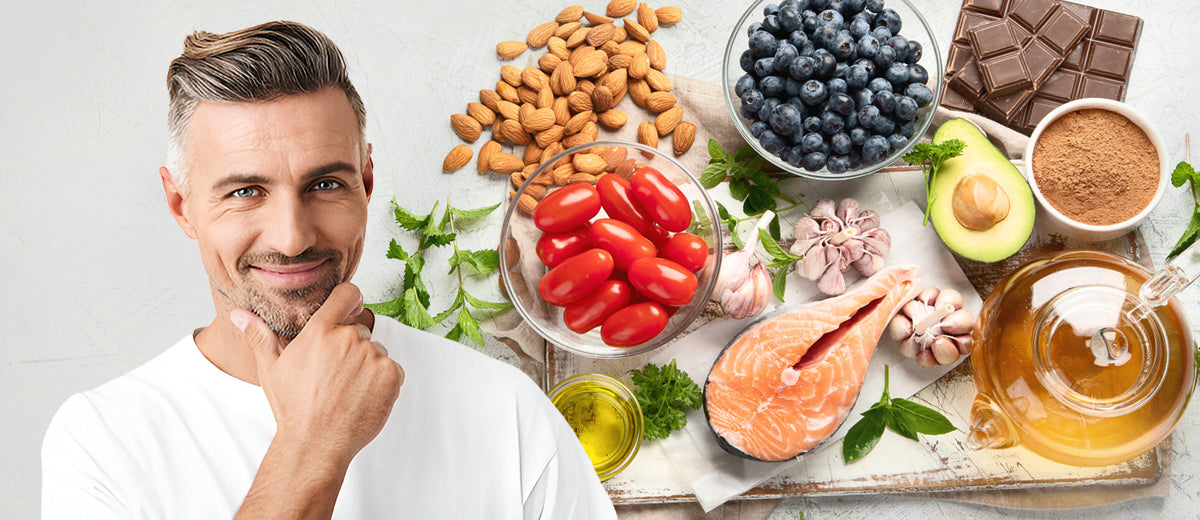Eating the right foods helps you stay active and feel your best as you age. Choosing the best foods for healthy aging supports brain health, bone strength, and heart wellness. A diet rich in antioxidant-rich fruits, lean proteins, whole grains, and healthy fats keeps your body strong and lowers the risk of disease. Adding calcium-rich foods, vitamin D sources, and hydrating vegetables improves mobility and energy levels. Good nutrition fuels your body, sharpens your memory, and helps you stay independent. Healthy eating is the simplest way to slow down aging and enjoy a vibrant, active life.

1. Why Nutrition Matters for Aging
Good nutrition keeps you active and independent as you grow older. Choosing nutrient-dense foods prevents muscle loss, improves immunity, and supports brain function. Skipping meals or relying on processed foods increases fatigue and illness risk. Eating fresh, whole foods gives your body what it needs to repair cells and fight inflammation. Balanced meals with protein, fiber, and healthy fats maintain a healthy weight, support energy, and lower the risk of chronic diseases like diabetes and heart disease as you age.
2. Antioxidant-Rich Fruits and Vegetables
Antioxidant-rich fruits and colorful vegetables protect your body from cell damage and keep your skin glowing. Include berries, oranges, spinach, tomatoes, and broccoli daily to fight free radicals and slow aging. These foods also boost memory, improve digestion, and keep your immune system strong. Eating five servings of fruits and vegetables every day provides fiber, vitamins, and minerals that promote longevity. Lightly steaming or roasting vegetables keeps nutrients intact. Pairing them with healthy fats like olive oil helps your body absorb fat-soluble vitamins more effectively.
3. Lean Proteins for Strength
Eating enough lean protein prevents muscle loss and supports healthy joints. Choose chicken, fish, eggs, beans, tofu, and lentils for meals. Protein builds and repairs tissues, which is vital as you age. Spread protein intake across breakfast, lunch, and dinner to keep energy levels steady. Adding collagen-boosting foods like bone broth supports joint health and skin elasticity. Pairing protein with whole grains and vegetables creates balanced meals that maintain strength and mobility well into later years.
4. Whole Grains and Fiber
Whole grains such as oats, quinoa, barley, and brown rice give long-lasting energy and support healthy digestion. These fiber-rich foods lower cholesterol and stabilize blood sugar, reducing the risk of heart disease and diabetes. Seniors should aim for at least three servings per day. Eating whole grains with lean protein keeps you full longer and prevents overeating. Choosing unprocessed grains over refined ones helps maintain a healthy weight and improves gut health, which plays a major role in overall well-being.
5. Healthy Fats and Brain Health
Healthy fats protect your brain and keep memory sharp. Include avocados, walnuts, chia seeds, and olive oil in your daily diet. Omega-3 fatty acids from salmon, sardines, and flaxseeds reduce inflammation and protect the heart. These fats also improve mood and cognitive function, which is important for mental well-being as you age. Replacing butter or processed oils with olive oil and nut butters creates heart-friendly meals that promote long-term brain and cardiovascular health at the same time.
6. Hydration and Micronutrients
Proper hydration keeps skin supple and joints flexible. Drink plenty of water and add hydrating vegetables like cucumbers and lettuce to your meals. Include calcium-rich foods like yogurt and fortified milk to protect bones, and pair them with vitamin D sources such as egg yolks or sun exposure to improve absorption. These nutrients work together to prevent fractures, boost energy, and keep your body functioning smoothly throughout the aging process.
